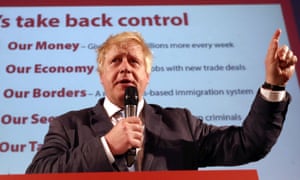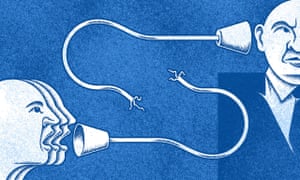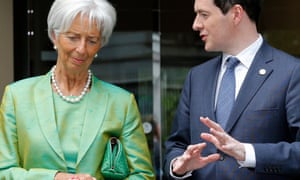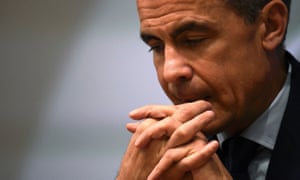Michael White in The Guardian

Brexiteers claim to revere the ancient British constitution, and ‘sovereignty’ is what it’s all about. Photograph: Carl Court/Getty Images
What if the Brexit camp wins the referendum on 23 June, as some polls are currently scaring sterling by suggesting? Could pro-remain MPs do as one anonymous minister told the BBC and use their parliamentary majority in a “reverse Maastricht” to protect UK access to the EU single market as part of the withdrawal?
They would do so, according to today’s enjoyable speculation, because they have an overwhelming cross-party majority to do so – 454 to 147 mostly rightwing Tories, on some calculations – and because they will be able to claim Brexit has not put up a coherent policy for Britain’s trade relationship with Brussels. It has put up many options, but has no mandate for many of them.
The very thought of such defiance – here’s the BBC’s James Landale’s account – will have Brexiteers spluttering in their foreign coffee. How dare those MPs defy what will, they hope, be the sovereign will of the British people as expressed through the ballot box?
The short answer to that is simple: of course parliament can defy the referendum result, because the British constitution clearly states that “the crown in parliament” – ie a majority of elected MPs, subject to whatever the Lords tries to moderate – is sovereign.
Since Brexiteers claim to revere the ancient British constitution, and “sovereignty” is what it’s all about – not an excess of Polish plumbers or Bangladeshi restaurants – they can hardly complain about its correct and immaculate application.
There’s a second, telling point, which you will instantly remember when I point it out. Because parliament is sovereign, it can’t be bound, even by a referendum result. Legally speaking, the vote is only advisory.
So much for the legal situation by which many rigid minds think these matters are resolved. In the practical world of politics – politics is always more practical than theoretical – could it be done, if there was the political will among assorted parties to do so?
The short answer, again, is yes. Again the Brexiteers will cry outrage, but since they don’t have a coherent answer themselves it will be open to bold leaders to seize the initiative and sort things out the best way they can.
Remember, even the mud-splattered figure of Michael Gove admitted at the weekend that Britain would still be in the EU when the 2020 election takes place, and that withdrawal would be protracted and messy. Remember too that all sorts of awkward events would follow a Brexit vote.
Sterling would take a hit, so would inward investment and, probably, exports. The Bank of England is making plans. Foreign holders of UK assets – they hold a lot of cash and debt, lots of property of one kind or another – will look at the balance of payments on traded goods and levels of government debt and start moving on, as footloose foreigners do everywhere. They’re not here for the weather. Unions arerightly anxious.
So it would be stormy. “We would accept the mandate of the people to leave the EU,” says one unnamed minister, but everything else would be negotiable. Since they regard access to the EU single market as the most important component of the deal, that is what they would insist on. A majority of MPs from Labour, Lib Dem, Tories (not backbench Tories) and assorted nationalists, notably the 56-strong SNP contingent (suspended MPs included), could then insist on embracing the Norwegian model, one of the many mooted as the ideal relationship by the Brexit campaign.
Yes, I know, there are many others, including the World Trade Organisation’s (WTO) open market scenario. But that is unlikely to stand up to much exposure to the sunlight that would pour through every British window every day after a Brexit triumph – east and west facing windows at the same time, too.
So it would be up to David Cameron and his advisers to decide how best to proceed. Yes, I realise that amateur plotters in the Tory ranks are planning to unseat Cameron if he loses, and some of them if he wins – Matthew D’Ancona is urging Dave to get tough. Does he have it in him? Not sure, but here’s hoping.
This has been a damaging period for Tory unity and many nasty things have been said on both sides. But come the day a majority of MPs will realise that their more swivel-eyed colleagues are best left to their own devices while the humdrum reality of day-to-day real life and government is resumed. If Brexit wins there would be much to do, all day and every day, and a country to run as well.
Cameron would look the best man to do the job and it would be his duty not to slope off because it was his decision alone that dropped us into this referendum shambles, done for party tactical reasons. In normal times that would be enough to finish him off, but these are not normal.
Jeremy Corbyn regularly shows how unsuited he is for any heavy lifting – he’s getting the worst of both worlds by campaigning only feebly against Brexit – and neither Boris Trump nor Govey have emerged with much dignity from the campaign. I’d watch that Theresa May if I were you, Dave, but why wouldn’t she want Cameron to clean up his own dirty kitchen before taking over and giving it a makeover?
Tory papers like the Mail and Telegraph are outraged by the attacks made over the weekend by the likes of Sir John Major. Norman Tebbit – the Tory Tony Benn, disloyal to the point of treachery but not quite crossing the fellow travellers’ Ukip line – is fuming. It would be funny if it were not serious.
Back to the Maastricht rebellion, which so disfigured and weakened decent John Major’s years in office in the 90s when, like Cameron now, he only had a wafer-thin majority. Actually Major did pretty well at the treaty negotiations, his opt-outs kept us out of the euro among other things. Were the ingrates grateful? Of course not. As Ken Clarke once witheringly put it, they are middle-aged (now elderly) men who feel their lives have not been sufficiently exciting.
The Maastricht years were a shambles, good sport for reporters like me, but grim. Yet it is diehard Maastricht disloyalists like Tebbit, John “Vulcan” Redwood and dear but daft Bill Cash who are now crying loyalty; Iain Duncan Smith, who inherited Tebbit’s Chingford seat, too. No wonder Major was so scornful.
Not since Jeremy Corbyn, serial rebel in 500 votes, appealed for loyalty from old comrades to whom he had shown little has there been such cause for dry mirth. Ah, but Iain and Jeremy were doing what they believe in and what their constituents want, will come the retort. And you think that pro-remain MPs can’t say that too?
So the “reverse Maastricht” tactic is both legal and politically feasible. All it would take – the Norway model or any that looks better on the day – is leadership and willpower. Nicola Sturgeon would be a more slippery but also more reliable ally for Cameron (pause for ironic laughter) than Corbyn-led Labour.
But what about the free movement of EU labour in and out of the UK, which Norway’s deal would require us to embrace as part of the price for access? Correct, but for all its populist talk and tabloid extravagance about immigration, Brexiters have not cracked that one either. And they’ve still got to win. Two weeks to go.
Aditya Chakrabortty in The Guardian

‘Voters believe that even if they did exercise their right to leave the EU, the politicians wouldn’t obey them.’ Illustration by Matt Kenyon
Neil was speckled with paint from his trousers to his spectacle lenses, and had come straight from work to the vape shop. When I asked which side he’d be backing in the EU referendum, he projected as if addressing a rally. He wanted everyone to know he was damned if he was going to vote. “It’s an illusion that we’ve got a say in it. We don’t live in a democracy. The day of having a common working man standing for us here or in Europe – it’s over.”
We were in Pontypool, south Wales. As a valleys boy (“I smell of sheep”), Neil had been brought up Labour. But now, “It’s all lies, isn’t it?” Then came the sins: Blair “a big liar”; the political class in the pockets of the bankers.
It was the refrain I kept getting last week across south Wales – and have heard in many other regions too. That dissolution in old loyalties, that breakdown in trust, runs wide and deep – and it already marks the referendum on 23 June. Opinion polls show that voters believe that even if they did exercise their right to leave the EU, the politicians wouldn’t obey them. This is what a democratic crisis looks like.
Although journalists often remind us that this is the first vote the British have had on Europe in 40 years, they rarely dwell on what happened last time round. Yet the torchlight of history shows just how much has changed. While today’s polls show leave and remain neck and neck, the 1975 referendum on whether Britain should stay in the European Economic Community was as good as won before it was even announced. The then prime minister, Harold Wilson, led a coalition of the establishment – all three parties, the unions, the business lobbies, the press – and emerged with a 2:1 majority to stay in.
“Europhoria” is how the Guardian reported the results. Its leader began: “Full-hearted, wholehearted and cheerful hearted: there is no doubt about the ‘yes’.” Imagine anything even close to that being said in two weeks’ time – after months of sullen and sour campaigning, of close colleagues branding one another “liars”, “luxury-lifestyle” politicians and “Pinocchio”.
“Wilson would never have asked a question of which he couldn’t be confident of the answer,” says historian Adrian Williamson. Contrast that with David Cameron, who once claimed he wanted to be prime minister because he’d be “rather good at it”, but now resembles a short-tempered supply teacher struggling to control his own class.
Panicked by a fear of Nigel Farage and the ultras in his own party, the Tory leader has staged a referendum for which there was little public appetite and which he may now, incredibly, lose.
Months were spent trailing a deal that the prime minister was going to strike with Germany’s Angela Merkel and the rest – a rewriting of the rules that was going to form the basis of this referendum. You’ve barely heard about that deal since.
Posed a question few of them were actually asking, voters have wound up raising their own. Why haven’t my wages gone up? How will the kids get on the housing ladder? When will my mum get her knee replacement? All good questions, none of which are actually on the ballot paper. The likely result is that on 23 June, many of those who do vote will try to squeeze a multitude of other answers into one crude binary.
In 1975 Roy Jenkins, another son of Welsh coal and steel, explained the result as: “The people took the advice of people they were used to following.” Classic Jenkins, but also an expression of the classic role of mass political parties. When they had millions of members, both Labour and the Conservatives served as the brokers between the people they represented and the “experts”, the authoritative midpoint between ideology and empirics.
Neither party can claim to be mass any more, least of all the Tories – low on members, bankrolled by hedge funds and the City. This creates what Chris Bickerton, politics lecturer at Cambridge, calls “the crisis of political mediation”.
No longer claiming the same democratic legitimacy as their predecessors, Cameron and George Osborne have had to borrow their authority from other sources: Mark Carney and the Bank of England, the International Monetary Fund, the Treasury. These technocrats, much cited by broadcasters and jittery remainers, are one of the two main sources of authority in our democracy. The other is the post-truth brigade, as channelled by Boris Johnson and Michael Gove, who advise voters to ignore the nuance, trust their gut – and blame migrants or the Brussels fatcats.
British democracy in 2016 comes down to this: a prime minister can no longer come out and say something and expect to be believed. He or she must wheel out a common room-full of experts. He or she can expect to be called a liar in the press and by their colleagues. He or she can only hope that some of what they say resonates with an electorate that has tuned them out.
And mainstream politicians have only themselves to blame. Over the past three decades, Britons have been made a series of false promises. They have been told they must go to war with a country that can bomb them in 45 minutes – only to learn later that that was false. They have been assured the economy was booming, only to find out it was fuelled by house prices and tax credits.
New Labour pledged an end to Margaret Thatcher’s unfairness, except that – as the Centre for Research into Socio-Cultural Change has shown – the richest 20% of households scooped as much of the income growth under Brown and Blair as they had under the Iron Lady.
Britons were told austerity would last five years, tops – although we will now endure at least a decade.
And the people of south Wales were told new industries would replace the coal and steelworks. Looking out of the shop window, Neil remembered how Pontypool on market days like today would be “rammed”. Now it was half-empty. “It’s dead now, because they took what they wanted,” he said. “Thatcher smashed the unions. There used to be coalmines all around here. Boosh – we’re out of here. They’ve moved on.”
Cameron and the rest of the political class are learning a lesson the hard way. You can only break your promises to the public so many times before they refuse to put any more trust in you. After that, you have to rely on Threadneedle Street and the Treasury to corrode their own finite reputation for impartiality.
Whichever way the ballots go on 23 June, the public will continue returning a vote of no-confidence in Westminster for a long time to come.
Andre Spicer in The Guardian
Thinking is hard work and asking tough questions can make you unpopular. So it’s no wonder that even clever people don’t always use their brains

Scene from The Big Bang Theory: ‘Having a high IQ score does not mean that someone is intelligent.’ Photograph: CBS/Everett/Rex
We all know smart people who do stupid things. At work we see people with brilliant minds make the most simple mistakes. At home we might live with someone who is intellectually gifted but also has no idea. We all have friends who have impressive IQs but lack basic common sense.
For more than a decade, Mats Alvesson and I have been studying smart organisations employing smarter people. We were constantly surprised by the ways that these intelligent people ended up doing the most unintelligent things. We found mature adults enthusiastically participating in leadership development workshops that wouldn’t be out of place in a pre-school class; executives who paid more attention to overhead slides than to careful analysis; senior officers in the armed forces who preferred to run rebranding exercises than military exercises; headteachers who were more interested in creating strategies than educating students; engineers who focused more on telling good news stories than solving problems; and healthcare workers who spent more time ticking boxes than caring for patients. No wonder so many of these intelligent people described their jobs as being dumb.
While doing this research I realised that my own life was also blighted with stupidities. At work I would spend years writing a scientific paper that only a dozen people would read. I would set exams to test students on knowledge I knew they would forget as soon as they walked out of the examination room. I spent large chunks of my days sitting in meetings which everyone present knew were entirely pointless. My personal life was worse. I’m the kind of person who frequently ends up paying the “idiot taxes” levied on us by companies and governments for not thinking ahead.
Clearly I had a personal interest in trying to work out why I, and millions of others like me, could be so stupid so much of the time. After looking back at my own experiences and reading the rapidly growing body of work on why humans fail to think, my co-author and I started to come to some conclusions.
Having a high IQ score does not mean that someone is intelligent. IQ tests only capture analytical intelligence; this is the ability to notice patterns and solve analytical problems. Most standard IQ tests miss out two other aspects of human intelligence: creative and practical intelligence. Creative intelligence is our ability to deal with novel situations. Practical intelligence is our ability to get things done. For the first 20 years of life, people are rewarded for their analytical intelligence. Then we wonder why the “best and brightest” are uncreative and practically useless.
Most intelligent people make mental short cuts all the time. One of the most powerful is self-serving bias: we tend to think we are better than others. Most people think they are above average drivers. If you ask a class of students whether they are above the class average in intelligence, the vast majority of hands shoot up. Even when you ask people who are objectively among the worst in a certain skill, they tend to say they are above average. Not everyone can be above average – but we can all have the illusion that we are. We desperately cling to this illusion even when there is devastating evidence to the contrary. We collect all the information we can find to prove ourselves right and ignore any information that proves us wrong. We feel good, but we overlook crucial facts. As a result the smartest people ignore the intelligence of others so they make themselves feel smarter.
Being smart can come at a cost. Asking tricky questions, doing the research and carefully thinking things through takes time. It’s also unpleasant. Most of us would rather do anything than think. A recent study found that when left alone in a room, people preferred to give themselves electric shocks than quietly sit and think. Being smart can also upset people. Asking tough questions can quickly make you unpopular.
Intelligent people quickly learn these lessons. Instead of using their intelligence, they just stay quiet and follow the crowd – even if it is off the side of a cliff. In the short term this pays off. Things get done, everyone’s lives are easier and people are happy. But in the long term it can create poor decisions and lay the foundations for disaster.
Next time I find myself banging my own head and asking myself “Why are you so stupid?”, I will try to remind myself that I’m trapped in the same situation as many millions of others: my own idiocy probably came with a payoff.
Chidanand Rajghatta in the Times of India
Pathetic homeless dork. Patiently hoping for degree. Professor had doubts. These are some expansions for the much-vaunted acronym PhD, formally a Doctor of Philosophy no matter what one's subject of research and expertise. Regarded as the acme of scholarship, it stands at a rarefied academic height that takes immense effort and time to reach. Probably heavily in Debt, please hire -- desperate, and patently headed downhill are some of the other self-deprecating expansions doctoral candidates throw out to explain their striving.
Which one of these gloomy explanations applied to IIT-Stanford alumnus Mainak Sarkar as he lost it one fine morning last week is hard to say. Perhaps all. He loaded up two guns he had purchased, broke into the home in Minnesota of his estranged wife Ashley and shot her dead. He then drove 2500km to snuff out the life of his PhD adviser and professor William Klug at the University of California (UCLA) in Los Angeles.
Mainak Sarkar met every gratuitous grad student putdown -- to a high degree.
The life of an Indian PhD scholars in the US centers around ''adviser and Budweiser,''goes an old joke in desi circles. They are generally regarded as a quiet, reticent, insular, and industrious lot, who tread the straight path between lab, library, home, and an occasional beer. American universities covet them because of their undemanding and non-confrontational nature, and the fealty and value they bring to the program. Often socially awkward and taciturn, many work doubly hard and wrap up their degree in quick time.
From all accounts, Sarkar conformed to the mould. Hailing from a modest Bengali family from Durgapur, where his father was a clerk in a cement factory, he was said to be a bright student in school. Accounts from his college years suggest he was introverted. After a bachelor's degree from IIT Kharagpur in 2000, he worked briefly at Infosys in Bangalore before heading out to Stanford for his master's, a route taken by many Indians, notably Google's Sundar Pichai.
But while IITian titans such as Vinod Khosla and Pichai chose to do an MBA after their masters, setting the template for what many of today's US-bound Indian engineers do, Sarkar opted for the road less travelled these days because of the toil and hardship involved: A PhD program -- at UCLA's Henri Samueli School of Engineering.
PhD programs can be brutal. In fact, such is the struggle involved in earning a doctorate that a dedicated satirical strip called PhD comics by former grad student Jorge Cham, which follows the lives of several doctoral students, is a must-read for the PhD crowd. PhD in this instance stands for Piled Higher and Deeper, a degree that follows BS (Bull Shit) and MS (More of the Same). From the difficulties of research to the complex student-adviser equation, Cham explores the exhausting grind of the indigent PhD scholar, from slumming it out in deadbeat digs to the perpetual search for free food.
Central to the strip is the tortured time-span of a PhD program that appears to be interminable. One brilliant strip shows a fresh PhD candidate in his first year announce to the world ''Here I come!'' with visions of winning the Nobel Prize, and in the second year, revolutionizing the field. By the third year, he is reduced to hoping he'll get a job in the university, and by the fourth year, just get any job, anywhere. By the fifth year, he's just hoping to attend some conference in Podunk, Minnesota, and wishing they will lay out pepperoni pizza.
Mainak Sarkar's struggle to earn his doctorate extended to at least eight years, in part because he was locked in a grad student's ultimate nightmare: an adversarial relationship with the guide/mentor/supervisor. ''You can't even begin to describe the sense of gloom and doom,'' one grad student who has been through the mill explained. ''And it gets worse as people who joined the program after you graduate before you, and you are still there, hanging on in quiet desperation.''
The situation has gotten worse in recent years with US universities awarding doctoral degrees at an accelerating pace (nearly 60,000 annually), despite the economic downturn proving a dampener for the career prospects of those who graduate. According to one recent study, less than 17% of new PhDs in science, engineering and health-related fields find tenure-track positions within three years after graduation. Stress levels are high and fear and frustration are endemic at the prospect of seeing a lifetime of study not pay off.
Already 38, Sarkar struggled to make a living after a tortured academic career culminating in a PhD that was grudgingly granted to him in 2013 (earlier versions of this story said he was a grad student into his tenth year, but Klug colleagues have said they graduated him in 2013 despite his subpar thesis mainly to get rid of him). He then took up a job in Ohio, working remotely as an engineering analyst. For reasons unknown, it did not last long. Nor did his marriage.
It is not clear what role his personal turmoil played in the deterioration on the academic front or whether it was the other way around. But early this year Sarkar started ranting online about his adviser Klug, accusing him of stealing his code and passing it to other students.
Such intellectual property spats are not uncommon in the doctoral research world, though the UCLA Engineering School, named after its professor Henri Samueli, is a standout example of an ideal mentor-mentee relationship. Samueli and his PhD student Henry Nicholas founded Broadcom, a chip company that topped $150 billion in market cap at the height of the dotcom bubble and sold for $37 billion a couple of years ago. It is arguably the most successful teacher-student collaboration in history in financial terms.
The Sarkar-Klug ties didn't follow the script. It ended in death - a murder-suicide that took them both to a different PhD: A premature and horrible Death.
Aditya Chakrabortty in The Guardian
IMF economists have published a remarkable paper admitting that the ideology was oversold
‘You hear it when the Bank of England’s Mark Carney sounds the alarm about ‘a low-growth, low-inflation, low-interest-rate equilibrium’. Photograph: Dylan Martinez/AFP/Getty Images
What does it look like when an ideology dies? As with most things, fiction can be the best guide. In Red Plenty, his magnificent novel-cum-history of the Soviet Union, Francis Spufford charts how the communist dream of building a better, fairer society fell apart.
Even while they censored their citizens’ very thoughts, the communists dreamed big. Spufford’s hero is Leonid Kantorovich, the only Soviet ever to win a Nobel prize for economics. Rattling along on the Moscow metro, he fantasises about what plenty will bring to his impoverished fellow commuters: “The women’s clothes all turning to quilted silk, the military uniforms melting into tailored grey and silver: and faces, faces the length of the car, relaxing, losing the worry lines and the hungry looks and all the assorted toothmarks of necessity.”
But reality makes swift work of such sandcastles. The numbers are increasingly disobedient. The beautiful plans can only be realised through cheating, and the draughtsmen know it better than any dissidents. This is one of Spufford’s crucial insights: that long before any public protests, the insiders led the way in murmuring their disquiet. Whisper by whisper, memo by memo, the regime is steadily undermined from within. Its final toppling lies decades beyond the novel’s close, yet can already be spotted.
When Red Plenty was published in 2010, it was clear the ideology underpinning contemporary capitalism was failing, but not that it was dying. Yet a similar process as that described in the novel appears to be happening now, in our crisis-hit capitalism. And it is the very technocrats in charge of the system who are slowly, reluctantly admitting that it is bust.
You hear it when the Bank of England’s Mark Carney sounds the alarm about “a low-growth, low-inflation, low-interest-rate equilibrium”. Or when the Bank of International Settlements, the central bank’s central bank, warns that “the global economy seems unable to return to sustainable and balanced growth”. And you saw it most clearly last Thursday from the IMF.
What makes the fund’s intervention so remarkable is not what is being said – but who is saying it and just how bluntly. In the IMF’s flagship publication, three of its top economists have written an essay titled “Neoliberalism: Oversold?”.
The very headline delivers a jolt. For so long mainstream economists and policymakers have denied the very existence of such a thing as neoliberalism, dismissing it as an insult invented by gap-toothed malcontents who understand neither economics nor capitalism. Now here comes the IMF, describing how a “neoliberal agenda” has spread across the globe in the past 30 years. What they mean is that more and more states have remade their social and political institutions into pale copies of the market. Two British examples, suggests Will Davies – author of the Limits of Neoliberalism – would be the NHS and universities “where classrooms are being transformed into supermarkets”. In this way, the public sector is replaced by private companies, and democracy is supplanted by mere competition.
The results, the IMF researchers concede, have been terrible. Neoliberalism hasn’t delivered economic growth – it has only made a few people a lot better off. It causes epic crashes that leave behind human wreckage and cost billions to clean up, a finding with which most residents of food bank Britain would agree. And while George Osborne might justify austerity as “fixing the roof while the sun is shining”, the fund team defines it as “curbing the size of the state … another aspect of the neoliberal agenda”. And, they say, its costs “could be large – much larger than the benefit”.

IMF managing director Christine Lagarde with George Osborne. ‘Since 2008, a big gap has opened up between what the IMF thinks and what it does.’ Photograph: Kimimasa Mayama/EPA
Two things need to be borne in mind here. First, this study comes from the IMF’s research division – not from those staffers who fly into bankrupt countries, haggle over loan terms with cash-strapped governments and administer the fiscal waterboarding. Since 2008, a big gap has opened up between what the IMF thinks and what it does. Second, while the researchers go much further than fund watchers might have believed, they leave in some all-important get-out clauses. The authors even defend privatisation as leading to “more efficient provision of services” and less government spending – to which the only response must be to offer them a train ride across to Hinkley Point C.
Even so, this is a remarkable breach of the neoliberal consensus by the IMF. Inequality and the uselessness of much modern finance: such topics have become regular chew toys for economists and politicians, who prefer to treat them as aberrations from the norm. At last a major institution is going after not only the symptoms but the cause – and it is naming that cause as political. No wonder the study’s lead author says that this research wouldn’t even have been published by the fund five years ago.
From the 1980s the policymaking elite has waved away the notion that they were acting ideologically – merely doing “what works”. But you can only get away with that claim if what you’re doing is actually working. Since the crash, central bankers, politicians and TV correspondents have tried to reassure the public that this wheeze or those billions would do the trick and put the economy right again. They have riffled through every page in the textbook and beyond – bank bailouts, spending cuts, wage freezes, pumping billions into financial markets – and still growth remains anaemic.
And the longer the slump goes on, the more the public tumbles to the fact that not only has growth been feebler, but ordinary workers have enjoyed much less of its benefits. Last year the rich countries’ thinktank, the OECD, made a remarkable concession. It acknowledged that the share of UK economic growth enjoyed by workers is now at its lowest since the second world war. Even more remarkably, it said the same or worse applied to workers across the capitalist west.
Red Plenty ends with Nikita Khrushchev pacing outside his dacha, to where he has been forcibly retired. “Paradise,” he exclaims, “is a place where people want to end up, not a place they run from. What kind of socialism is that? What kind of shit is that, when you have to keep people in chains? What kind of social order? What kind of paradise?”
Economists don’t talk like novelists, more’s the pity, but what you’re witnessing amid all the graphs and technical language is the start of the long death of an ideology.
Penny Anderson in The Guardian
Being a landlord is a privilege, and it shouldn’t be available to everybody: with the power they have over their tenants should come a sense of responsibility

‘Owners misunderstand, ignore or forget legal requirement to issue proper notices to quit, or the need for prior warning of inspection visits.’ Photograph: Alamy
There are more private landlords than ever. Many are reasonable. Some are even excellent, but letting property is largely unrestricted.
Sadiq Khan, the mayor of London, has highlighted the failure of his predecessor Boris Johnson to sign up 100,000 landlords to his much vaunted London Rental Standard, which aims to help landlords with things such as having a gas safety check every year, and the laws around deposits and fire safety. After two years in operation, the scheme had attracted fewer than 2,000 landlords in addition to the 13,300 it inherited.
The files reveal that officials warned the mayor at the outset that his target was unattainable and that it would take “more than 50 years to accredit a sufficient number of landlords to meet the target”. Another note read: “We simply don’t have the resources to proactively enforce the London Rental Standard, which leaves us with an unacceptable reputational risk.” Johnson’s betrayal of renters in the capital after all the promises made is embarrassing for him, but a disaster for tenants. There is no doubt that the job needs doing.
Dilettante amateur property investors often know little about basic good practice, the law or simply what’s best for everyone when it comes to running their business in a civilised, humane fashion – and yes, it is a business, with the potential for profit and loss. They might be reluctant or “forced” rentiers (a term I prefer to landlord), with the family home in negative equity, compelled to rent it out if they want to move on. Outside London this is still a reality, and with the predicted house-price crash on Brexit, that practice may become more widespread.
This situation fuels the likelihood that tenants will be turfed out as soon as possible when the building increases in value. Remember that all tenants live under the threat of just two months’ notice when their initial assured shorthold tenancy rolls over. There is no security for renters.
There are recurring issues, such as owners who do not understand the concept of reasonable wear and tear expecting their properties to remain pristine and unmarked, even when the low-quality carpets and sofas they chose were threadbare to begin with. This in turn propagates the now traditional unlawful deposit retention/deduction battle, which can see mundane events – the simple act of using the sofa perhaps – cited as justification for the retention of hundreds of pounds, obliging tenants to fight for, and rarely succeed in getting, the return of hard-earned money paid up-front.

‘There are recurring issues, such as owners not understanding the concept of reasonable wear and tear, even when the low-quality carpets and sofas they chose were threadbare to begin with.’ Photograph: Popperfoto/Getty Images
There are the problems of legal management. Owners misunderstand, ignore or forget the legal requirement to issue proper notices to quit, or the need for prior warning of inspection visits, using the power of thought or suggestion instead. Some owners I have rented from imagine they can let themselves in whenever they see fit.
Let’s be reasonable. We know that property doesn’t manage itself, and can be costly to maintain. The obligation to repair causes tension once owners, even the best-intentioned ones, grow acquainted with the expense of emergency out-of-hours plumbing.
Some owners – through indolence or meanness – would rather let the place rot; a friend’s landlord knowingly allows water from the leaky tiles to be absorbed by cavity wall insulation. Ultimately, his roof will cave in, but he doesn’t seem to care – either about the tenant or the ultimate expense. Other owners issue “revenge” notices – where tenants are forced out for insisting on damage being made good. Tenants who stand up for their rights are frequently viewed as troublemakers.
Tenants are not angelic. Some give as good as they get in the owner-tenant relationship. But the balance of power between the two is clearly in the landlord’s favour. Isn’t it time for power with more responsibility?
A requirement for landlord training would allow neophyte property moguls to escape being bogged down in pointless, petty battles with tenants. They also would learn about both the availability (and wisdom) of landlord insurance and the pros and cons of letting agents, who charge up to 15% of income and often do very little to earn it.
Being a landlord is a profitable privilege, but it isn’t one that should be automatically available to everybody. It should be earned by those who prove themselves knowledgeable and capable, having passed both a “fitting person” test and a criminal records check. Don’t forget: landlords possess keys to their tenants’ homes, and need to understand obligations. Owners would also benefit from better safeguards and more clarity because both would improve their relationships with tenants, and contented tenants stay longer in their properties.
The rentier economy marches on and will continue to do so, because set against the decline in pensions and increasing job insecurity, property is regarded as a solid guarantee against poverty. The fact that people make money from renting isn’t a problem. Nor is the fact that these transactions occur in the private sector. What’s missing and badly needed is the idea of responsibility.






